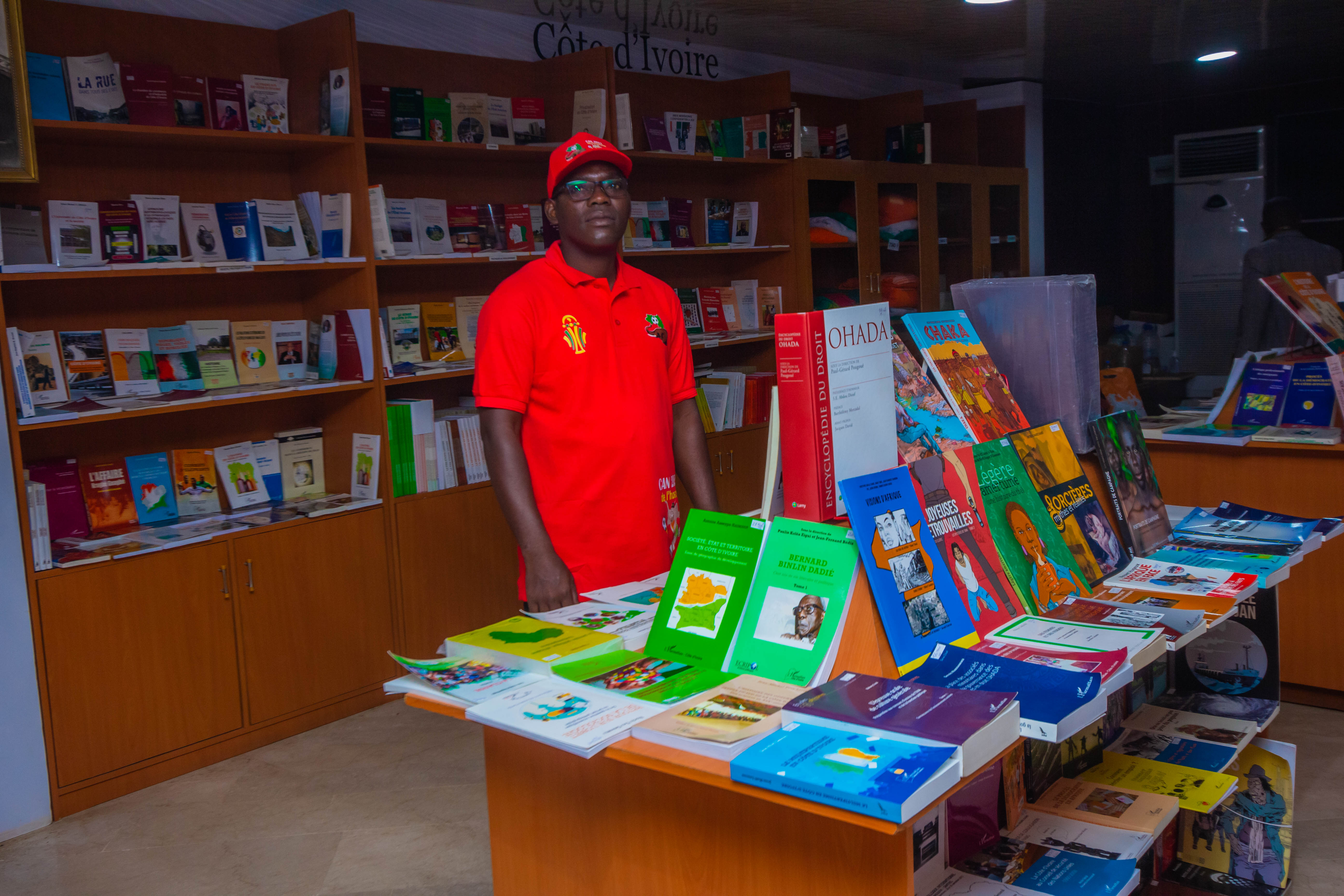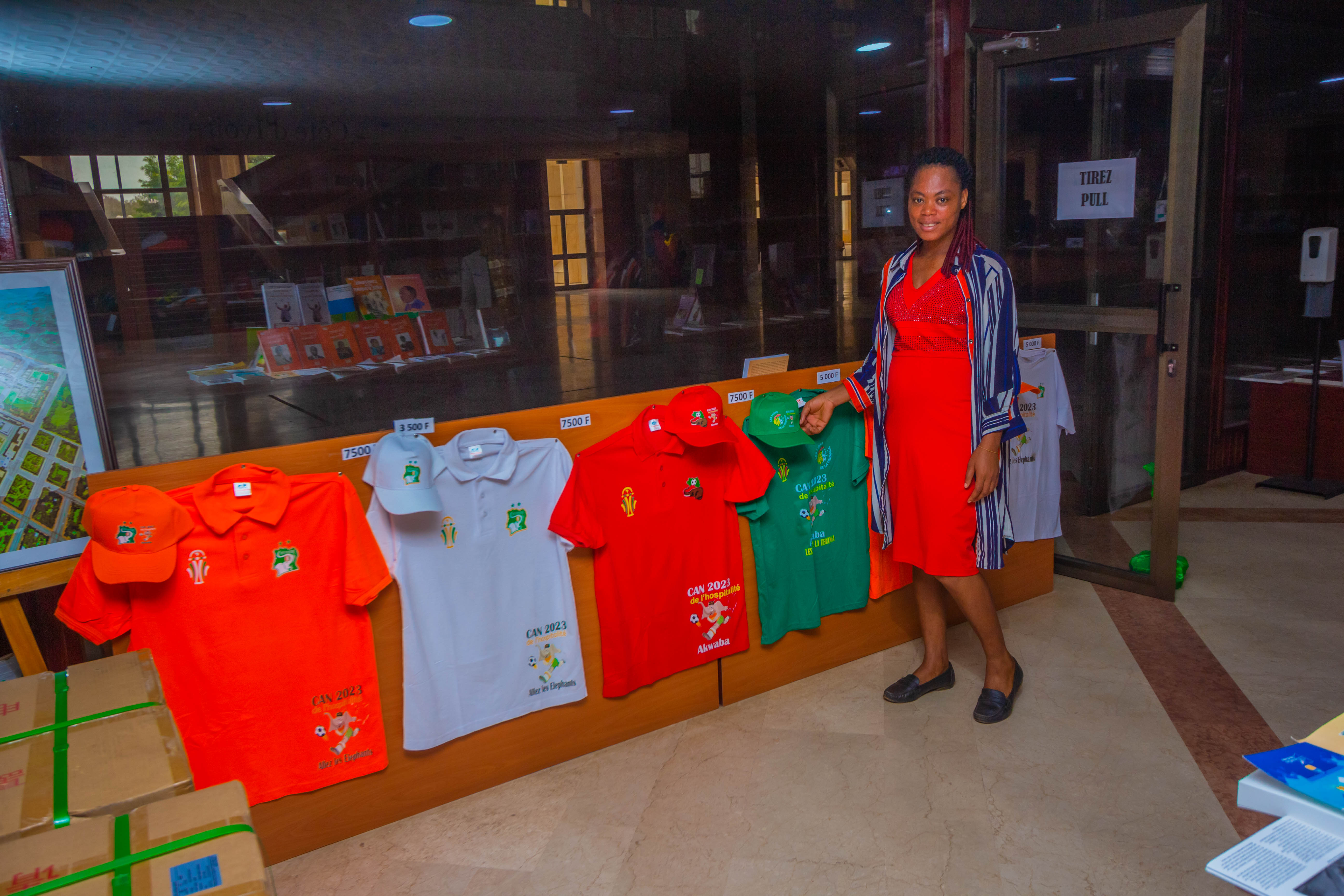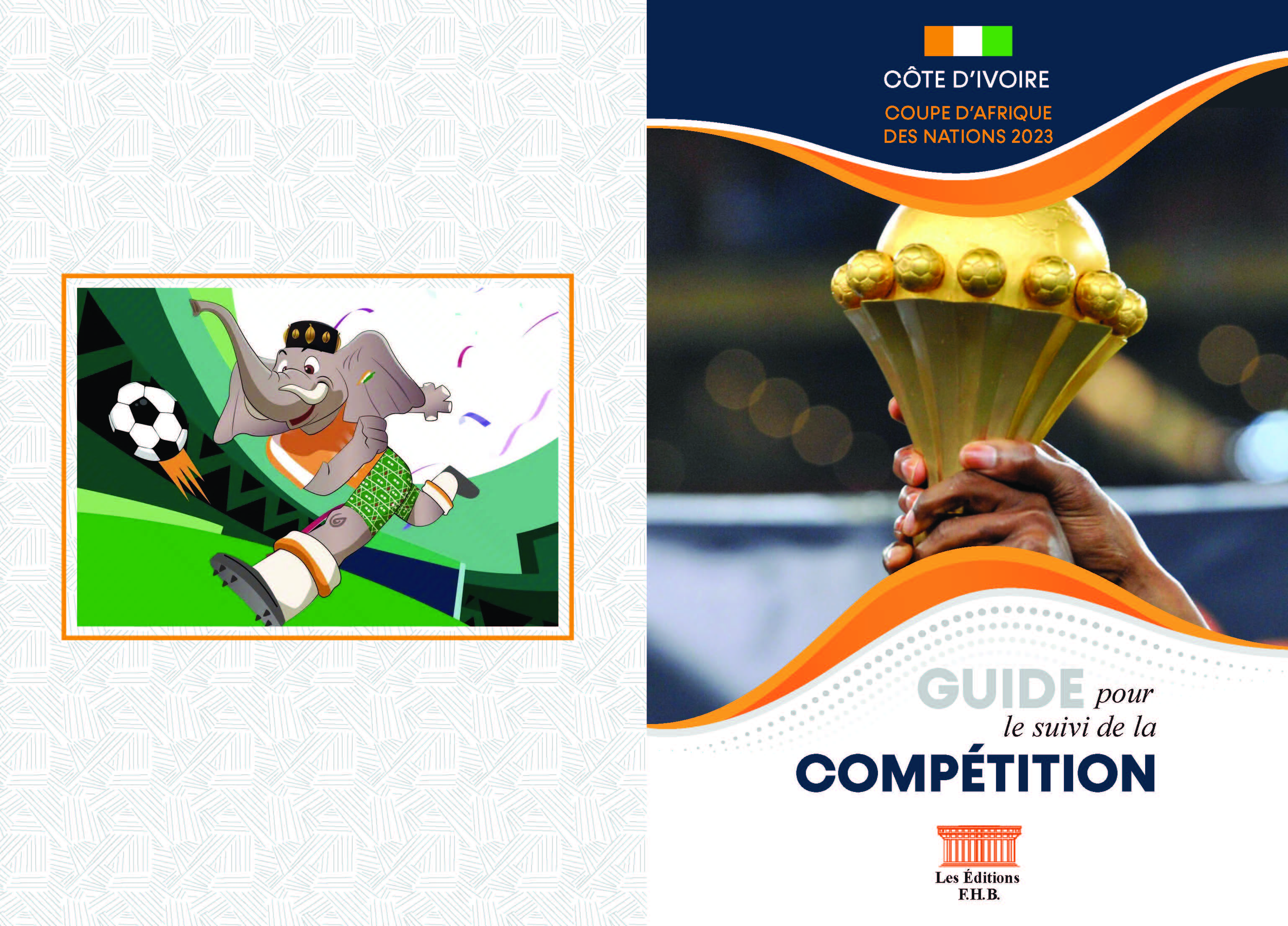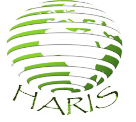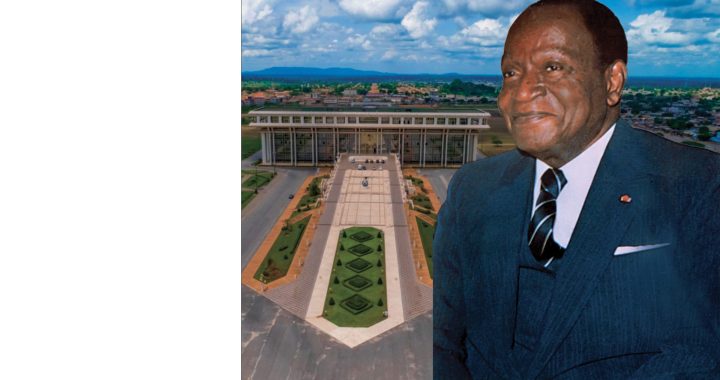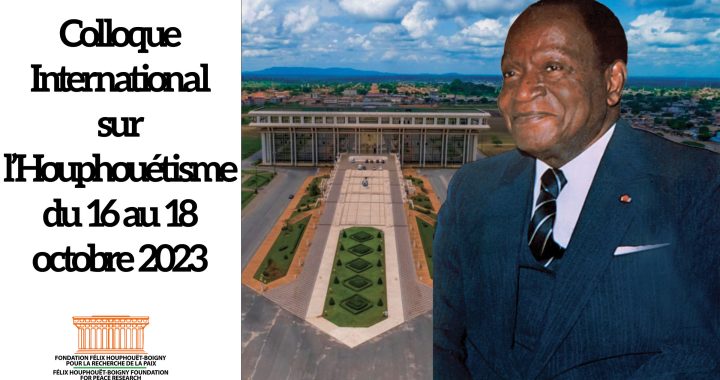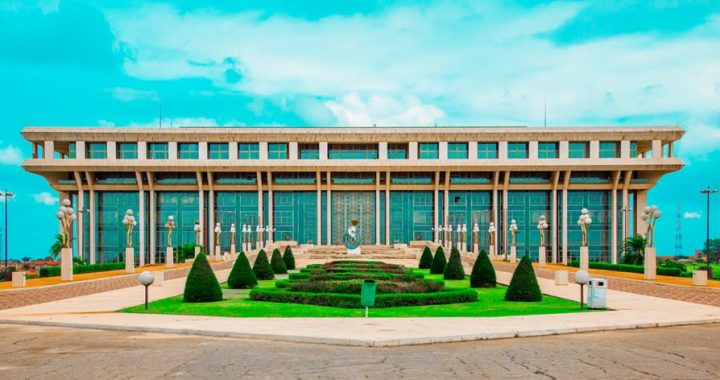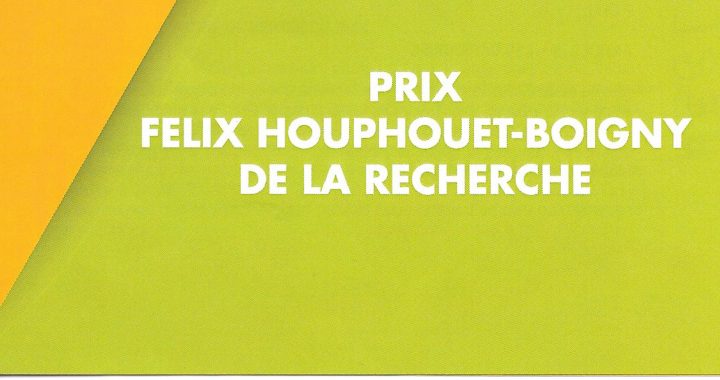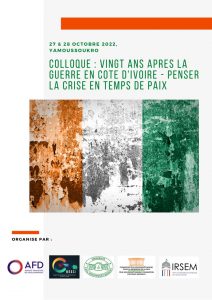Get your copy of the Guide pour le Suivi de la Coupe d’Afrique des Nations CAN 2023 at the Félix Houphouët-Boigny Peace Research Foundation Bookshop, and many other articles.
Category Archives: News
News from the Félix Houphouët-Boigny Foundation in English.
Call for Contributions for the Eleventh Issue of the Haris Review to be published in December 2023
For its eleventh issue to be published in December 2023, the Haris Review is looking for contributions on topics of International Relations, Geopolitics or Strategic Studies. Articles should be original and substantive. The standards of presentation of the manuscripts are those of the CAMES (to be consulted on the website of the journal www.revueharis.org). The manuscript must be between 5000 and 8000 words long and must include the full name of the author(s), the name of the institution to which the author(s) belong(s), the email address, a photo of the author(s) and an abstract in French and English of 300 words maximum with 7 keywords.
E-mails (to be sent simultaneously): cerriuao01@gmail.com, contact1@revueharis.org.
Calendar
Call for papers: October 1, 2023
Deadline for submission of papers: December 5, 2023
Return to authors after instruction: December 20, 2023
Return of corrected articles: December 27, 2023
Publication: December 30, 2023
Fees
Instruction : 25,000 F CFA (39 Euros)
Publication : 40,000 F CFA (61 Euros)
Contact: Dr. SILUE Nahoua Karim Tel (+225) 07 08 33 00 53 (WhatsApp) for the modalities of payment of the fees and all useful information.
FHB Foundation 2023 activities calendar
January
Tuesday, January 17, 2023
10:00am. Press conference on the 2023 commemorations
Thursday, January 19
10:00am. Official launch ceremony for the 2023 commemorations, at the Félix Houphouët-Boigny Foundation for Peace Research
Friday, January 20th
1:00pm. Muslim service at the Grand Mosque of Yamoussoukro
Sunday January 22nd
10:30am. Thanksgiving Mass at the Basilica of Our Lady of Peace
February
Tuesday, February 7th
10:00am. Inaugural lecture: “Félix Houphouët-Boigny, a model for Ivorian and African youth”, by Pr Jean-Noel Loucou, at the Foundation’s Yamoussoukro headquarters.
Wednesday, February 8th
11:00am. Ceremony to award the Félix Houphouët-Boigny-UNESCO Peace Prize to the 2022 Laureate, Chancellor Angela Merkel of the Federal Republic of Germany, at the Foundation’s headquarters in Yamoussoukro.
March
Tuesday, March 1st
10:00 am. Preparation of the touring caravan for the FHB exhibition
April
Wednesday, April 5th
10:00am. Public lecture on “Forced labor and its abolition”, by Dr. Alassane Diabaté, at the Université Péléforo Gon Coulibaly in Korhogo.
Saturday, April 29th
Field day for peace in Yamoussoukro: popular cross-country race, Maracana tournament, pétanque competition
May
Wednesday May 24 to Friday May 24
Training seminar on the culture of peace for staff of the Abengourou Regional Department of Culture and the Francophonie, by Dr Diénéba Doumbia.
June
Monday 19th to Saturday 24th June
23rd edition of the Open Golf de Cote d’Ivoire, with the Félix Houphouët-Boigny trophy.
July
Tuesday July 6 to Thursday July 8
Culture of peace training seminar in Guiglo department
August
Monday, August 7th
10:00am. Celebration of Independence Day
3:00pm-6:00pm. Sports activities
September
Friday, September 1st
9:00am-2:00pm Citizenship training seminar in the Haut-Sassandra region
October
Monday October 16th
10:00am. Opening of the colloquium on Houphouétisme
3pm-6pm. Conference proceedings
Tuesday, October 17th
10:00am-12:00pm. Conference proceedings
3:00pm-6:00pm. Conference proceedings
Wednesday, October 18
10am-12pm. Conference proceedings
3:00pm. Closing of the symposium
4:00pm. Final of the “Les cracks de la paix” competition, organized by Radio de la Paix
8:00pm. Official dinner. Presentation of the Félix Houphouët-Boigny Research Prize
November
Friday, November 10th
Fiftieth anniversary of the creation of the FHB Foundation
8:00am-6:00pm. Open House
11:00am. Inauguration of the FHB Foundation Print Shop
5:00pm. Book signing at the Foundation bookshop
Wednesday, November 15th
National Day of Peace
8:00am-4:00pm. Sports activities
5:00pm. Public lecture on “Félix Houphouët-Boigny’s foreign policy” by Professor Kouadio N’Guessan at the FHB Foundation.
Friday, November 24th
Tribute to Félix Houphouët-Boigny in Dimbokro
Saturday, November 25th
Tribute to Félix Houphouët-Boigny in Toumodi
December
Saturday, December 2nd
Farmers pay tribute to Félix Houphouët-Boigny, at the Foundation’s Yamoussoukro headquarters
Thursday, December 7th
12:30pm. Thanksgiving mass at the Basilica of Our Lady of Peace in Yamoussoukro
4:00pm. Tribute to President Marie-Thérèse Houphouët-Boigny at Foundation headquarters in Yamoussoukro
Saturday December 16th
9pm to 6am. Grand peace concert at Place Jean-Paul II in Yamoussoukro
End of commemorations
International symposium on Houphouetism
Houphouétisme is the neologism coined to designate the considerable thought, action, work and legacy of Félix Houphouët-Boigny, the first President of the Ivorian Republic. Today, it is accepted by all Ivorians, regardless of political party. Held to be the national conscience, it constitutes the fundamental element of Ivorian unity, political identity and heritage.
Call for Contributions for the Tenth Issue of the Haris Review to be published in June 2023
For its tenth issue to be published in June 2023, the Haris Review is looking for contributions on topics of International Relations, Geopolitics or Strategic Studies. Articles should be original and substantive. The standards of presentation of the manuscripts are those of the CAMES (to be consulted on the website of the journal www.revueharis.org). The manuscript must be between 5000 and 8000 words long and must include the full name of the author(s), the name of the institution to which the author(s) belong(s), the email address, a photo of the author(s) and an abstract in French and English of 300 words maximum with 7 keywords.
E-mails (to be sent simultaneously): cerriuao01@gmail.com, contact1@revueharis.org.
Calendar
Call for papers: April 1, 2023
Deadline for submission of papers: June 5, 2023
Return to authors after instruction: June 20, 2023
Return of corrected articles: June 27, 2023
Publication: June 30, 2023
Fees
Instruction : 25,000 F CFA (39 Euros)
Publication : 40,000 F CFA (61 Euros)
Contact: Dr. SILUE Nahoua Karim Tel (+225) 07 08 33 00 53 (WhatsApp) for the modalities of payment of the fees and all useful information.
Press Conference of the Secretary General of the Félix Houphouët-Boigny Foundation for Peace Research on January 17, 2023 in Yamoussoukro
INTRODUCTORY STATEMENT
Dear professionals of the public and private media,
Ladies and Gentlemen
Thank you very much for responding to our call for this press conference on the activities of the Félix Houphouët-Boigny Foundation in the year 2023.
I would like to begin with a pleasant duty, that of wishing you our best wishes and our sincere wishes for this new year. May it bring you health, professional success, prosperity and peace.
The Foundation is also very grateful for the regular coverage of its activities that your various bodies provide for the nation and the world.
I have chosen to speak to you about three major events that the Foundation is about to experience: the commemoration of the thirtieth anniversary of the death of President Félix Houphouët-Boigny, the celebration of the fiftieth anniversary of the creation of the Félix Houphouët-Boigny Foundation, and finally, the solemn ceremony for the award of the UNESCO-Félix Houphouët-Boigny Peace Prize at the Foundation’s headquarters in Yamoussoukro.
I. COMMEMORATIONS OF THE YEAR 2023
December 7, 1993-December 7, 2023, thirty years since the death of President Félix Houphouët-Boigny.
November 10, 1973-November 10, 2023, fifty years since the Félix Houphouët-Boigny Foundation was created.
These two major events must be appropriately commemorated.
The Foundation has already commemorated the twenty years of the death of the Father of the Nation in 2013 and the twenty-five years in 2018. It will do so on a larger scale for the thirty years.
The solemn award ceremony will take place on Wednesday, February 8, 2023.
A. Justification of the commemorations
Côte d’Ivoire is gradually emerging from three decades of crisis, the consequences of which are many. Peace and security are under constant threat, particularly from terrorism, the social fabric needs to be stitched up, and economic reconstruction must continue.
The President of the Republic, His Excellency Alassane Ouattara, has been working since he took office in 2011 to bring back peace and promote national reconciliation. The creation of various structures to ensure national reconciliation and strengthen social cohesion, such as the Dialogue, Truth and Reconciliation Commission (CDVR), the National Commission for Reconciliation and Compensation of Victims (CONARIV), and the National Program for Social Cohesion (PNCS), are part of this effort.
To emerge definitively from these years of crisis, Ivorians must adopt new attitudes and behaviors that promote the values of the culture of peace. They must also learn all the lessons of the past through a duty to take stock, a duty to repent and a duty to remember.
The commemoration of the thirtieth anniversary of the death of President Félix Houphouët-Boigny offers this opportunity to come together in unity and peace. And to make known his thought, his historical action, his work of peace, to promote national reconciliation.
The Foundation, created in 1973, is the most appropriate institution to perpetuate the work of peace of Félix Houphouët-Boigny and to promote the culture of peace. It brings to the table its fifty years of experience, first as a political and historical research institute, then as an international peace research center.
B. Description of the Commemoration Project
1. The objectives
The general objective is to make known the thought and work of Félix Houphouët-Boigny, and to promote the culture of peace and national reconciliation in Côte d’Ivoire.
The specific objectives are :
- commemorate the thirtieth anniversary of the death of Félix Houphouët-Boigny;
- to celebrate the fiftieth anniversary of the creation of the Félix Houphouët-Boigny Foundation;
- to raise awareness about the culture of peace and national reconciliation;
- to produce cultural products on Félix Houphouët-Boigny and peace.
2. The expected results
Ivorians are made aware of the work of Félix Houphouët-Boigny, the culture of peace and national reconciliation.
Cultural products are produced and disseminated.
The Félix Houphouët-Boigny Foundation for the search for peace is better known and promoted.
3. The target audience
The commemorations concern all Ivorians, regardless of their ethnicity, religion or political party. They also concern foreign populations living in Côte d’Ivoire, as well as all peace-loving women and men.
4. The organization
The commemorations will take place over 12 months and will be based on
- Scientific activities with the holding of an international symposium on “Houphoutism”, the organization of public conferences, the publication of books.
- Festive activities: organization of concerts, theatrical performances, exhibitions.
- Sports activities: cross country, soccer competitions, hand sports
- Religious activities: thanksgiving masses, ecumenical prayers.
C. Schedule of activities
The commemorations will be spread out over the twelve months of the year 2023. Each month is devoted to a particular theme with specific activities. The objective is to revisit the entire political career of Félix Houphouët-Boigny: the union leader, the founder of political parties, the parliamentarian, the minister, the president. Two days are dedicated to the political parties that claim him, notably the PDCI-RDA and the RHDP, for their tribute.
The activities will culminate in the last quarter of the year with the holding of the international colloquium on “Houphouët-Boignyism” in October; the celebration of the creation of the Foundation in November; and finally the commemoration of the thirtieth anniversary of the death of President Houphouët-Boigny and the end of the events with a giant concert for peace in December.
II. THE UNESCO-FELIX HOUPHOUET-BOIGNY PEACE PRIZE
According to the Director-General of UNESCO, Federico Mayor, the creation of this Prize is a tribute to a man who made dialogue and the search for peace the foundations of his political philosophy.
“To pay tribute to the work of President Félix Houphouët-Boigny for world peace, one hundred and twenty (120) countries sponsored a resolution in 1989, adopted unanimously by UNESCO Member States, to establish an International Prize for Peace Research.
The purpose of the Prize is to honour living persons, institutions or organizations, public or private, which have made a significant contribution to the promotion, research, safeguarding or maintenance of peace in accordance with the Charter of the United Nations and the Constitution of UNESCO. (Article 1 of the Statutes of the Prize).
A. Organization of the Prize
The Prize
The Prize shall be financed by the interest earned on the capital constituted by the endowment initially paid by President Félix Houphouët-Boigny through the Félix Houphouët-Boigny Foundation for Peace Research. It is in the amount of US$150,000.
Mr. Abdou Diouf, former President of the Republic of Senegal, and Mr. Henri Konan Bédié, former President of the Republic of Côte d’Ivoire, have been designated respectively Patron of the Prize and Protector of the Prize intuitu personae by President Félix Houphouët-Boigny, who has chosen them as representatives to act on his behalf.
The Jury
The Jury is made up of personalities of international renown, known and respected for their commitment to the cause of peace.
The first Jury of eleven (11) members was presided over by Mr. Henry Alfred Kissinger, former U.S. Secretary of State, Nobel Peace Prize winner.
The current international jury of six (6) members is chaired by Mr. Denis Mukwege, Nobel Peace Prize winner.
Members of the international jury :
Mr. Michel Camdessus, former Managing Director of the International Monetary Fund (France)
Mr. Santiago Gamboa-Samper, writer, journalist and diplomat (Colombia)
Mr. Denis Mukwege, gynecologist, Nobel Peace Prize 2018 (Democratic Republic of Congo)
Mr. Thomas Pesquet, astronaut, FAO Goodwill Ambassador (France)
Ms. Hayat Sindi, UNESCO Goodwill Ambassador (Saudi Arabia)
Mr. Forest Whitaker, actor, producer and director, UNESCO Goodwill Ambassador (United States)
Nominations
Candidates must make a significant contribution to the pursuit of peace and the promotion of a culture of peace in their respective fields. The Prize may be awarded to an individual, an institution, another entity or a non-governmental organization. (Article 3 of the Statutes).
The Director-General of UNESCO shall officially invite, by 30 November of the year preceding the year of the award of the Prize, by circular letter, all Member States in consultation with their National Commissions for UNESCO and non-governmental organizations maintaining an official partnership with UNESCO to submit nominations.
In addition to the Member States and non-governmental organizations mentioned above, the following may submit nominations
(i) former winners of the Félix Houphouët-Boigny Peace Prize
(ii) academies or academicians
(iii) centers and foundations specializing in the fields of peace research
(iv) institutes of international law
(v) members of the International Court of Justice
(vi) members of parliaments or governments
(vii) associations or organizations working for peace and human rights and for the advancement of democratic values in the world, in accordance with the Constitution of UNESCO and the Charter of the United Nations
(viii) university rectors and professors of history, political science and law
(ix) Nobel Prize laureates.
(Article 6 of the Statutes)
Procedures for awarding the Prize
The Prize shall be awarded at a solemn ceremony held at UNESCO Headquarters in Paris, or at any other place proposed by the parties concerned. The solemn ceremony was held at the Félix Houphouët-Boigny Foundation in Yamoussoukro in 1995 and in Dakar, Senegal, in 1997.
If two or three people are involved in the awarding of the Prize, it is awarded to them jointly.
If a laureate declines the prize, the jury submits a new proposal to the Director General.
The winner receives a cheque for $150,000, a gold medal and a diploma signed by the Director-General of UNESCO.
B. The Laureates and the scope of the Prize
In the thirty years of its existence, the Prize has distinguished 29 laureates, individuals or legal entities from the five continents.
Laureates for Africa
Nelson Mandela, President of the African National Congress (ANC) and Frederik De Klerk, President of the Republic of South Africa in 1991.
Abdoulaye Wade, President of the Republic of Senegal in 2005.
Abiyi Ahmed, Prime Minister of the Republic of Ethiopia in 2019.
Laureates for North American
Jimmy Carter, Former President of the United States, in 1994.
George J. Mitchell, U.S. Senator, former Special Advisor to the President of the United States on Irish Affairs in 1998.
Laureates for South American
Alvaro Enrique Arzu Irigoyen, President of the Republic of Guatemala and Commander Rolando Moran, representative of the Guatemalan National Revolutionary Union (URNG), in 1996.
Luiz Inacio Lula Da Silva, President of the Federal Republic of Brazil, in 2008.
Association of Grandmothers of Plaza de Mayo (Argentina), represented by its President, Mrs. Estela Barnes de Carlotto, in 2010.
Laureates for Asia
Fidel Valdez Ramos, President of the Republic of the Philippines and Nur Misuari, President of the Moro National Liberation Front (MNLF) of the Philippines, in 1997.
Sheikh Hasina, Prime Minister of the People’s Republic of Bangladesh, in 1998.
Kay Rala Xanana Gusmao, President of the Democratic Republic of East Timor, in 2002.
Laureates for Europe
The Hague Academy of International Law (Netherlands), in 1992.
Juan Carlos I, King of Spain, in 1994.
Community of Sant’Egidio (Italy), in 1999.
Cardinal Roger Etchegaray, President Emeritus of the Pontifical Council for Justice and Peace (Vatican) and Dr Mustafa Ceric, Grand Mufti of Bosnia, in 2003.
Martti Ahtisaari, Former President of Finland, Diplomat and Mediator of the United Nations, in 2007.
François Hollande, President of the French Republic, in 2013.
Ms. Guiseppina Nicolini, Mayor of Lampedusa (Italy) and the NGO SOS Méditerranée, in 2017.
Mrs. Angela Merkel, former Chancellor of the Federal Republic of Germany in 2022
Laureates for the Middle East
Mr. Yitzhak Rabin, Prime Minister of the State of Israel, Mr. Shimon Peres, Minister of Foreign Affairs of the State of Israel and Mr. Yasser Arafat, President of the National Authority of Palestine, in 1993.
Laureates for the United Nations System
United Nations High Commissioner for Refugees and Ms. Sadako Ogata, United Nations High Commissioner for Refugees, in 1995.
Ms. Mary Robinson, United Nations High Commissioner for Human Rights, in 2000.
The Award is one of the most prestigious in the United Nations system. Its scope is remarkable.
In Côte d’Ivoire, the date of creation of the Prize, November 15, 1989, has been perpetuated by the institutionalization of a national day of Peace, celebrated every November 15. It is an opportunity to celebrate peace and to root the values of the culture of peace.
The Prize has contributed to strengthening UNESCO’s principle of universality, to fostering dialogue among nations, to easing tensions in conflict areas such as Southern Africa and the Horn of Africa, Latin America, the Middle East and Southeast Asia.
C. The reform of the Prize
The decision of the 199th session of the Executive Board of UNESCO, adopted by the Member States, called for the revision of the Statutes of the Prize with a view to improving its governance and management in line with the revised strategy for UNESCO prizes.
As a result, the Statutes of the Prize were amended in 2018. The main changes are as follows:
- the name of the Prize is now the UNESCO Félix Houphouët-Boigny Peace Prize;
- It is no longer awarded annually, but every two years;
- the State of Côte d’Ivoire is now a stakeholder and undertakes to contribute to the capital of the Prize, the interests of which are used to reward the laureates;
- the governance of the Prize is no longer the responsibility of an autonomous Executive Secretariat, but of one of UNESCO’s Assistant Directorates-General;
- the Prize shall have a renewable duration of six years;
- the Jury of the Prize is composed of six personalities (instead of eleven) from the five continents, known and respected for their commitment to the cause of peace;
- An international commission and a college of former laureates of the Prize contribute to the promotion of the Prize and of peace. The Félix Houphouët-Boigny Foundation for Peace Research is in charge of this commission.
Jean-Noël LOUCOU
Secretary General of the Foundation
Félix Houphouët-Boigny Foundation for
for Peace Research
Winners of the Félix Houphouët-Boigny Research Prize
We created the Félix Houphouët-Boigny Research Award in 2017 to support scientific research on Félix Houphouët-Boigny, now a historical figure who has passed into posterity. The award recognizes the best master’s and doctoral research on Félix Houphouët-Boigny, defended in the public universities of Côte d’Ivoire.
The winner of the doctoral thesis receives a check for one million CFA francs and the winner of the Master’s degree, a check for five hundred thousand CFA francs.
The jury of the Prize is chaired by Professor Daniel Baha Bi Youzan, Dean of the UFR Humanities and Society of the University Felix Houphouet-Boigny.
𝟮𝟬𝟮𝟮:
<p style=”text-align: center;”><img class=”alignnone size-medium wp-image-10123″ src=”http://www.fondation-fhb.org/wp-content/uploads/2022/10/PRIX-FHB-DE-LA-RECHERCHE-2022-300×200.jpg” alt=”” width=”300″ height=”200″></p>
Master 2
BAKAYOKO Ousmane Djayéri, of the University Jean Lorougnon Guédé of Daloa
<strong>Governance strategy of ethnic pluralism under the regime of Felix Houphouet-Boigny from 1960 to 1990</strong>
Thesis
ANGU BLEOU Sylvain, of the University of Félix Houphouët-Boigny
<strong>The modalities of the formation of governmental political personnel under Félix Houphouët-Boigny from 1959 to 1993</strong>
<strong>2021:</strong>
<p style=”text-align: center;”><img class=”alignnone size-medium wp-image-10122″ src=”http://www.fondation-fhb.org/wp-content/uploads/2022/10/PRIX-FHB-DE-LA-RECHERCHE-2021-300×200.jpg” alt=”” width=”300″ height=”200″></p>
Master 2
TOURE Kayanton Charles, Félix Houphouët-Boigny University
<strong>Félix Houphouët-Boigny and regional disparities in Côte d’Ivoire from 1960 to 1980</strong>
Thesis
DALLY Jean-François Régis, University of Félix Houphouët-Boigny
<strong>Félix Houphouët-Boigny’s integration policy and ideological reconfiguration of Ivorian cities: the case of the District of Abidjan</strong>
<strong>2020:
</strong>Award not given due to covid-19 pandemic
<strong>2019:</strong>
<p style=”text-align: center;”><img class=”alignnone size-medium wp-image-10120″ src=”http://www.fondation-fhb.org/wp-content/uploads/2022/10/PRIX-FHB-DE-LA-RECHERCHE-2019-1-300×187.jpg” alt=”” width=”300″ height=”187″><img class=”alignnone size-medium wp-image-10121″ src=”http://www.fondation-fhb.org/wp-content/uploads/2022/10/PRIX-FHB-DE-LA-RECHERCHE-2019-2-300×189.jpg” alt=”” width=”300″ height=”189″></p>
Master 2
ZIE Ouattara, Jean Lorougnon Guédé University, Daloa
<strong>The last electoral battles of the regime of Félix Houphouët-Boigny: A cross-section of Fraternité-Matin and Le Nouvel Horizon, 1990 and 1992</strong>
Thesis
GADIE Charles Sylvain, Félix Houphouët-Boigny University
<strong>Migration policy under the governance of Félix Houphouët-Boigny and regional integration: The case of the establishment of allogeneous camps in the department of Bloléquin</strong>
<strong>2018:</strong>
<p style=”text-align: center;”><img class=”alignnone size-medium wp-image-10124″ src=”http://www.fondation-fhb.org/wp-content/uploads/2022/10/PRIX-FHB-DE-LA-RECHERCHE-2018-1-300×200.jpg” alt=”” width=”300″ height=”200″></p>
Master 2
BROU Hada Stéphanie Déborah, Félix Houphouët-Boigny University
<strong>Houphouët-Boigny’s educational policy and national integration</strong>
Thesis
LEOBLE BAKA Célestin, Félix Houphouët-Boigny University
<strong>Félix Houphouët-Boigny and the question of communism in Africa from 1946 to 1989</strong>
Call for Contributions for the Eighth Issue of Haris Review to be published in December 2022
For its Eighth issue to be published in December 2022, the Haris Review is looking for contributions on topics of International Relations, Geopolitics or Strategic Studies. Articles should be original and substantive. The standards of presentation of the manuscripts are those of the CAMES (to be consulted on the website of the journal www.revueharis.org). The manuscript must be between 5000 and 8000 words long and must include the full name of the author(s), the name of the institution to which the author(s) belong(s), the email address, a photo of the author(s) and an abstract in French and English of 300 words maximum with 7 keywords. E-mails (to be sent simultaneously): cerriuao01@gmail.com, contact1@revueharis.org
Calendar
Call for papers: October 3, 2022
Deadline for submission of articles: December 5, 2022
Return to authors after instruction: December 20, 2022
Return of corrected articles: December 27, 2022
Publication: December 31, 2022
Fees
Instruction : 25.000 F CFA (39 Euros)
Publication : 40.000 F CFA (61 Euros)
Contact: Dr. SILUE Nahoua Karim Tel (+225) 07 08 33 00 53 (WhatsApp) for the modalities of payment of the fees and all useful information.
Call for Papers for the Yamoussoukro International Colloquium on the descendants of migrants in West Africa
Yamoussoukro Symposium (Côte d’Ivoire)
Theme: “They are called “taboussés/taboussis”, “dankasa” … the descendants of migrants in West Africa
December 12-14, 2022
CALL FOR PAPERS
Argument
In West Africa, migration has been “a major socio-economic factor since the colonial conquests“. It is mainly internal migration in this subregion. Intensified in the colonial context, subregional migration was initially based on constraint, then became economic in the context of free labor migration. The countries of the hinterland (Burkina Faso, Mali, Niger) were perceived as a “reservoir” of labor and the countries of the coastal zone (Côte d’Ivoire, Ghana, Senegal, Nigeria) as “islands of prosperity. Gradually, a cumulative causality led to circular or definitive migrations. Whether premeditated or not, multi-annual, lifetime and permanent migrations contribute to the constitution of diasporas. The term diaspora, although accepted by the research community, is nevertheless the subject of epistemological debates and redefinitions in the West African geographical space. Indeed, to varying degrees, every country is both a home of emigration and a home of immigration.
The gradual settlement of migrants and their families in host countries has led to the construction of large diasporic communities. This has been done in different ways:
- migrants leaving their countries of origin left with their wives and had children in the host country,
- migrants, after a stay in the host countries, went temporarily to their countries of origin, contracted marriages there and returned to settle permanently,
- migrants have married native women in the host countries,
- descendants of migrants have married within the diaspora community, etc.
In fact, decades of immigration in host countries justify the presence of several generations of immigrants and descendants of immigrants. The case of the Ivory Coast is quite emblematic. As a major source of immigration in West Africa, there has been an upward trend in the number of immigrants, followed by a downward trend since the 1990s. The high proportion of non-nationals in the Ivorian population makes it unique, which gives rise to debate and confusion. We lose sight of the fact that the descendants of migrants were born in the host country to immigrant parents, grandparents or great grandparents. Whatever the reasons for their immigration, people of foreign origin need to integrate. The same is true for their descendants. To do so, they deploy various strategies on the economic, socio-cultural and legal levels. In fact, the lives of immigrants oscillate between complementary or opposing processes, namely:
- integration ie an adhesion and a sharing of values, logics that a will to belong to the host community while being recognized as a homogeneous whole;
- assimilation, i.e. blending into the host community while excluding any particularism.
The specific group of descendants of migrants is at the center of the reflections of this colloquium whose central theme is “Descendants of Migrants in West Africa“.
Concepts have been coined in national languages, both in the communities of origin of migrants, diasporic communities and host communities, to designate the descendants of migrants. These are, for example, the terms “taboussés/taboussis”, “dankasa”… whose history deserves analysis.
In the implementation of transnational migrations, transgenerational mechanisms and values have also been experimented. The integration of the descendants of migrants has singular stakes. Born in their parents’ country of immigration, they live in a sort of in-between situation. They are both from here (host country) and from elsewhere (country of origin). This situation is further reinforced when one of their parents is a national of the host country. This is the case in Ghana for the “dankasa”, a Hausa term for the descendants of immigrants born to Ghanaian mothers. West Africa being a large area of intra-regional migration and population mixing, the countries of the region, to varying degrees, are home to descendants of migrants. Côte d’Ivoire, Ghana, Senegal, Nigeria, Burkina Faso and Mali are examples of countries that are strongly impacted by the reality of the descendants of migrants. However, studies on this specific group are few and far between.
A fundamental question about the integration of descendants of migrants arises: How many generations of migrants’ children should still be considered in the immigrant population, when one is obviously not born an “immigrant”? In the host countries, the descendants of migrants constitute an increasingly important part of the population. This represents a fundamental demographic change in the countries of immigration. Because of their legal status, the descendants of migrants are divided between nationals of the host countries and those of the countries of origin. The latter return temporarily or permanently to their countries of origin for various reasons. Burkina Faso, for example, has for decades been receiving an increasing number of thousands of descendants of migrants from Côte d’Ivoire in search of enrollment in public universities.
A real reconstruction of identity is thus taking place in the host country, among the migrants and even more so among their descendants. To varying degrees, the latter maintain a link with both the country of birth and the country of origin, thus living in a “double registration”. Some descendants of migrants are progressively severing their ties with their countries of origin. They are then in advanced logics of integration and assimilation. Socio-cultural, economic, legal and political issues exist among the descendants of migrants in a context of various claims and denial of identity in the host and origin countries.
In the dynamics of transnationalism in the study of migration, papers could address the theme of the conference from the symbols of belonging, the logic of mobility, representations of territories, borders and nation-states of origin and the influence of communities.
Axes of thought
The major axes according to which the communications will be proposed are the following:
Axis 1: The socio-economic and cultural integration of the first generations of descendants of migrants and the issue of “return to the country
Axis 2: The questions of nationality/citizenship of descendants of migrants, their political commitments and statelessness
Axis 3: Identity constructions and feelings of belonging among the descendants of migrants: being from here and there.
Organizing institutions:
The colloquium is organized by the Félix Houphouët Boigny Foundation for Peace Research with partner universities: Université Félix Houphouët-Boigny, Université de Ouagadougou Joseph Ki-Zerbo, Université du Québec à Montréal.
Targeted participants
Various profiles of participants are expected to attend this conference. They are particularly, teachers-researchers from universities, researchers from research institutions, doctoral students. In addition to the world of higher education and research, participants are expected from experts in the field of migration, international institutions, NGOs, the political world and government institutions, etc.
Working languages
The working language of the conference is French. However, papers in English are accepted.
Scientific Committee:
President
Pr. MANDÉ Issiaka, Political Science Department, UQAM, Montreal, Canada.
Members
Pr. BANTENGA Moussa Willy, historian, Joseph Ki-Zerbo University, Ouagadougou, Burkina Faso.
Dr. M. C. CISSÉ Chikouna, historian, Université Félix Houphouët Boigny, Abidjan, Côte d’Ivoire.
Pr. LOUCOU Jean Noël, historian, Université Félix Houphouët Boigny, Abidjan, Côte d’Ivoire. Pr. NDIAYE Ndeye Dieynaba, jurist, Department of Legal Sciences, UQAM, Montreal, Canada.
Dr. SERHAN Nasser, Geographer, Université Félix Houphouët Boigny, Abidjan, Ivory Coast.
Pr. PICHÉ Victor, Honorary Professor, University of Montreal, Montreal, Canada.
Dr. M. C. PARÉ Moussa, historian, Université Félix Houphouët-Boigny, Abidjan, Ivory Coast.
Dr. M. C. SAWADOGO Boukary Mathias, historian, Université Félix Houphouët-Boigny, Abidjan, Ivory Coast.
Dr. M. C. SAWADOGO Mahamadou, sociologist, Joseph Ki-Zerbo University, Ouagadougou, Burkina Faso.
Dr. SOUKOUNA Sadio, political scientist, UQAM, Montreal, Canada.
Committee Secretariat
Dr. M. A. OUEDRAOGO Serge Noël, historian, Joseph KI-ZERBO University, Ouagadougou, Burkina Faso.
Dr. KABORÉ Adama, Abidjan, Ivory Coast.
Organizing Committee
President:
Dr. M. C. PARÉ Moussa, historian, Félix Houphouët-Boigny University, Abidjan, Ivory Coast.
Members
Dr. M. C. CISSÉ Chikouna, historian, University Félix Houphouët Boigny, Abidjan, Ivory Coast.
Dr. M. C. SAWADOGO Boukary Mathias, historian, University Félix Houphouët-Boigny, Abidjan, Ivory Coast.
Dr. M. A. OUEDRAOGO Serge Noël, historian, Joseph KI-ZERBO University, Ouagadougou, Burkina Faso.
Dr. KABORÉ Adama, Abidjan, Ivory Coast.
Terms of submission
Proposals for papers should include a title, first and last name, position, e-mail address, telephone number, institutional affiliation of the author(s) and an abstract (in French and English) of 250 words maximum, presenting the problematic of the subject, the theoretical and methodological framework and key words (maximum 5). The abstracts and articles, written in Times New Roman font, 1.5 line spacing, must be sent in Word format to the following address: colloquedescendantsdemigrants@gmail.com.
Practical dates
- July 30, 2022: Deadline for receipt of paper proposals
- August 15, 2022: Response to contributors/confirmation of participation in the conference
- October 30, 2022: Deadline for submission of papers
- December 12, 2022: Holding of the conference
- February 28, 2023: Submission of revised papers
- May 30, 2023: Publication of the proceedings of the conference.
Elements of bibliography
AL-ALI, N. and KOSER K., 2001, New Approaches to Migration? Transnational Communities and the Transformation of Home, Taylor & Francis Group.
ASIWAJU, A. I., 1976, “Migrations as Revolt: The Example of the Ivory Coast and the Upper Volta before 1945” in Journal of African History, vol. 17, no. 4, pp. 577-594.
BANTENGA M. W., 1996-1997, “De la connaissance de l’originalité démographique du pays moaaga à la mobilisation des populations dans le cadre des politiques coloniales (1888-1937)” in Science et Technique, vol. 22, n° 2, pp. 9-20.
BOUQUET C., 2003, Le poids des étrangers en Côte d’Ivoire / The importance of foreigners in Ivory Coast in Annales de Géographie, t. 112, n° 630, pp. 115-145.
BREDELOUP. S., 2004, ” La Côte d’Ivoire ou l’étrange destin de l’étranger ” in Revue européenne des migrations internationales, 19 (2), pp. 1-26.
CISSÉ C., 2013, Migrations et mise en valeur de la Basse Côte d’Ivoire (1920-1960), Les forçats ouest- africains dans les bagnes éburnéens, Paris, L’Harmattan, 311 p.
COLEMAN S. and MAIER K. “In, Of, and Beyond Diaspora: Mapping, Migration, and the Production of Space among Nigerian Pentecostals” in Diaspora: A Journal of Transnational Studies, vol. 19 n°. 1, 2010, p. 9-31. Project MUSE muse.jhu.edu/article/640334. COQUERY-VIDROVITCH, C., GOERG, O., MANDÉ, I. & RAJAONAH, F. V. (2003). Être étranger et migrant en Afrique au XXe siècle: Enjeux identitaires et modes d’insertion. Paris: L’Harmattan.
FAIST T. et al. 2011, The Migration-Development Nexus: A Transnational Perspective. Palgrave Macmillan.
FALL D., and FENEYROL O., 2011, Quelle protection pour les enfants concernés par la mobilité en Afrique de l’Ouest? Our positions and recommendations. s.n.
FARMA G., 2017-2018, L’entre-deux des descendants de migrants burkinabè en Côte d’Ivoire : Retour et intégration des étudiants ” diaspos ” dans le milieu universitaire au Burkina Faso, Master en médiation culturelle, Université de Lille 3, 149 p.
HILLMANN F. et al, editors, 2019, Trajectories and Imaginaries in Migration: The Migrant Actor in Transnational Space. Routledge.
http://www.ladocumentationfrancaise.fr/dossiers/d000073-immigration-et-politique- migratoire-en-france /immigres-assimilation-integration-insertion-some-definitions.
KABORÉ A., 2021, Mise en perspective historique des mutations migratoires voltaïques/burkinabè en Côte d’Ivoire (1960-2002), Thèse de doctorat unique, Histoire, UFHB, 421 p.
KIPRÉ P., 2010, Migrations en Afrique noire : La construction des identités nationales et la question des étrangers, Abidjan, Éditions du CERAP, 160 p.
MANDÉ I., 1995, ” Les migrations de travail des Voltaïques, une panacée pour l’économie ivoirienne de 1919 à 1960 ” in MASSA G. et MADIÉGA Y. G. (eds.), La Haute-Volta coloniale, témoignages, recherches, regards, Paris, Khartala, pp. 313-339.
KLEIS N. and THORSEN D., 2017, Hope and Uncertainty in Contemporary African Migration, Routledge.
OUÉDRAOGO S. N., 2019, ” Le dilemme de la nationalité chez les Burkinabè au Ghana ” in BREDELOUP S., DEGORCE A. and PALE A. (sous dir.), Se chercher en migration, Expériences burkinabè, Paris, L’Harmattan, pp. 77-97.
PICHÉ V. and CORDELL D. D., 2015, Entre le mil et le franc. Un siècle de migration circulaire en Afrique de l’Ouest. Le cas du Burkina Faso, Montreal, Presses de l’Université du Québec, Collection Les sociétés africaines en mutation, 406 p.
ROUCH J., 1956, “Migrations au Ghana” in Journal de la Société des Africanistes, volume 26, pp. 33-196.
SADOUNI S. and GAZIBO M., 2020, Migrations et gouvernance en Afrique et ailleurs, ed. Presses de l’Université du Québec, Project MUSE muse.jhu.edu/book/78362.
SAHOO A. K. and BRIJ M., 2007, Sociology of Diaspora: A Reader, Rawat Publications. SCHMOLL C., 2021, “L’approche transnationale dans les études migratoires. Retour sur 30 ans de travaux ” in SIMONNEAU D. (dir.), Dossier ” Vivre le transnational. Ancrages et circulations en débat “, De facto [En ligne], 28 | October 2021, online on 25 October 2021. URL : https://www.icmigrations.cnrs.fr/2021/09/15/defacto-028-01/
TOUNKARA D. G., 2010, ” Cinquante ans de politiques de la nationalité en Côte d’Ivoire “, in Outre-mers, Tome 97, n°368/369, pp. 159-175.
YODA H., 2019, Les colons d’origine voltaïque des villages de colonisation de la région de la Marahoue (Bouaflé et Zouénoula) : Entre immigration et intégration de 1933 à 2010, Thèse de doctorat unique, Histoire, UFHB, 554 p.
ZONGO M., 2003, ” La diaspora burkinabè en Côte d’ivoire: trajectoire historique, recomposition des dynamiques migratoires et rapport avec le pays d’origine ” in Revue africaine de sociologie, 7(2), pp. 58-72.
ZONGO M., 2016, ” La diaspora burkinabè en Côte d’Ivoire : entre vulnérabilité et quête d’appartenance ” in BREDELOUP S. et ZONGO M. (dir.), Repenser les mobilités burkinabè, Collection Études africaines, Paris, L’Harmattan, pp. 37-66.


